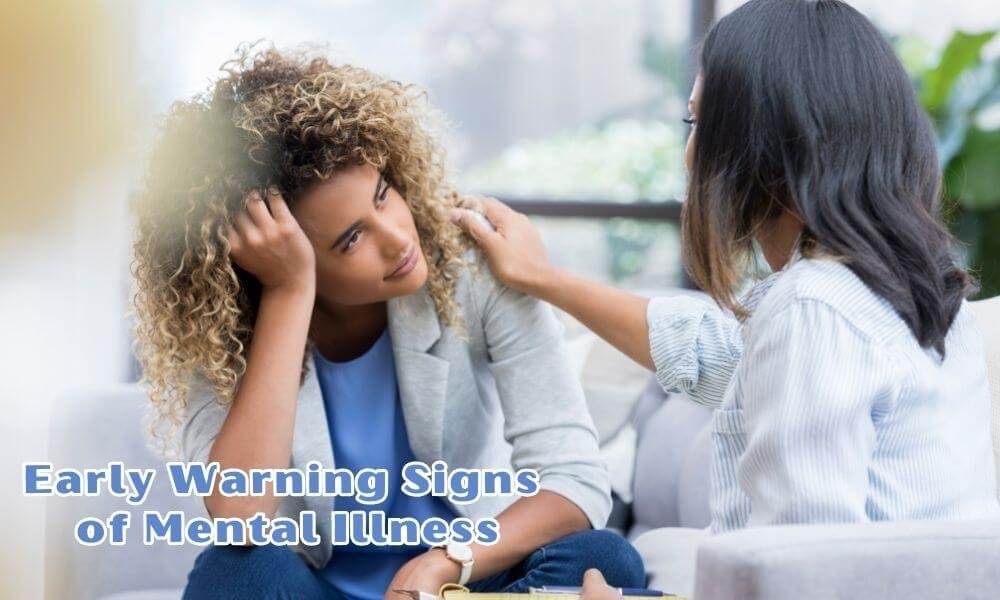Contents
- 1 Early Warning Signs of Mental Illness: A Comprehensive Guide
- 2 1. Importance of Early Detection
- 3 2. Common Early Warning Signs
- 4 3. Factors That Can Influence Mental Health
- 5 4. High-Risk Groups
- 6 5. How to Seek Help
- 7 6. Misconceptions and Stigmas
- 8 7. Ten Specific Early Warning Signs: Harmful Effects and Coping Strategies
- 8.1 A. Feeling Overwhelmed
- 8.2 B. Social Withdrawal
- 8.3 C. Persistent Irritability
- 8.4 D. Loss of Interest in Personal Appearance
- 8.5 E. Erratic Eating Habits
- 8.6 F. Frequent Nightmares or Sleep Disturbances
- 8.7 G. Substance Abuse
- 8.8 H. Unexplained Physical Pains
- 8.9 I. Emotional Outbursts
- 8.10 J. Intrusive Thoughts
Early Warning Signs of Mental Illness: A Comprehensive Guide
Introduction:
The Substance Abuse and Mental Health Services Administration (SAMHSA) estimates that in 2019, 51.5% of adults in the United States (or 51.5 million people) will experience a mental health condition.
More people are willing to talk about mental health, but it’s still hard to spot warning signs. Prompt medical attention often depends on the patient recognizing these symptoms. With reliable data, helpful suggestions, and cutting-edge analysis, this article aims to examine mental illness indicators thoroughly.
Please note that the content of this article is for educational purposes only and is not meant to replace the advice of a qualified medical professional. See a doctor or other medical professional for individualized care.

1. Importance of Early Detection
- Finding signs of mental health problems in their earliest stages can be life-changing. A National Alliance on Mental Illness (NAMI) study found that early identification and intervention can lead to better outcomes and lower long-term treatment costs. Intervention promptly can often even prevent a full-blown mental health crisis from occurring.
Benefits of Early Detection:
- Quicker access to treatment
- Lower financial burden in the long term
- Prevention of complications
- Improved quality of life
2. Common Early Warning Signs
Although the symptoms of mental illness appear differently in each individual, some indicators are fairly universal and can serve as early warnings. The following are some of the early warning signs that should be looked out for, as outlined by the American Psychiatric Association:
- Mood Changes: Rapid or dramatic shifts in emotions.
- Withdrawal: Lack of interest in social activities or work.
- Changes in Sleeping Patterns: Either too much or too little.
- Loss of Concentration: Difficulty in focusing or memory retention.
- Unexplained Aches and Pains: Constant physical distress for which no apparent explanation exists.
- Heightened Sensitivity: A heightened reaction to sensory input, such as light, sound, or touch.
3. Factors That Can Influence Mental Health
Various factors can contribute to the emergence of mental health issues, including:
- Genetic Factors: A mental illness in one’s family can be considered a risk factor.
- Environmental Factors: Alterations in lifestyle, stress, and traumatic experiences.
- Biological Factors: Uneven chemical composition of the brain.

4. High-Risk Groups
Certain groups are at higher risk for developing mental illnesses:
- Adolescents: According to the Centers for Disease Control and Prevention (CDC), 7.1% of children and adolescents between the ages of 3 and 17 have been diagnosed with anxiety.
- Seniors: The Substance Abuse and Mental Health Services Administration (SAMHSA) estimates that approximately 18% of adults aged 55 or older had some form of mental illness in the most recent year.
- Healthcare Workers: According to a report published by the American Medical Association, the pandemic has had a significant impact, as evidenced by forty percent of those employed in the healthcare industry experiencing burnout.
5. How to Seek Help
- If you observe any of these early warning signs, you should make an appointment with a healthcare provider as soon as possible. In times of crisis, resources such as the National Suicide Prevention Lifeline and the Crisis Text Line are available to provide immediate assistance.
6. Misconceptions and Stigmas
- stigmatization of mental illness, which occurs frequently, can discourage individuals from seeking help. Misconceptions like “mental illness is a sign of weakness” can negatively affect those affected. Education and a heightened awareness are necessary components in the fight against these beliefs.

7. Ten Specific Early Warning Signs: Harmful Effects and Coping Strategies
A. Feeling Overwhelmed
Harmful Effects:
Feelings of being overwhelmed regularly can make it difficult to function effectively in day-to-day life and even put you at risk for developing anxiety disorders.
Coping Strategies:
Consider practicing mindfulness and taking frequent, brief breaks if you want to become better at stress management. Get personalized advice on handling challenging situations from a mental health professional.
B. Social Withdrawal
Harmful Effects:
Isolation is a risk factor for depression as well as substance abuse because it increases the likelihood that an individual will turn to drugs or alcohol as a means of coping with the symptoms of depression.
Coping Strategies:
You should try to keep up some level of social interaction, even if it’s just a short conversation with a friend or member of your family.
C. Persistent Irritability
Harmful Effects:
Irritability that lasts for long periods can put a strain on relationships and may be an indicator of an underlying mood disorder.
Coping Strategies:
Learn how to relax and manage your stress with these techniques. Please see a medical professional so that an accurate diagnosis and treatment plan can be developed for you.

D. Loss of Interest in Personal Appearance
Harmful Effects:
Neglecting personal hygiene and appearance could indicate a mental health problem such as severe anxiety or depression.
Coping Strategies:
Establish a few manageable grooming goals for yourself, and make it a point to stick to them consistently.
E. Erratic Eating Habits
Harmful Effects:
Eating excessively or insufficiently can hurt physical health and lead to eating disorders.
Coping Strategies:
Maintain a balanced diet, and consult a healthcare provider for advice on developing a treatment strategy for your condition.
F. Frequent Nightmares or Sleep Disturbances
Harmful Effects:
Sleep deprivation can exacerbate mental health conditions, which can harm overall well-being.
Coping Strategies:
Make sure that you maintain a regular sleep schedule and a calming routine before going to bed. You should speak with a sleep specialist if the issue is not resolved.
G. Substance Abuse
Harmful Effects:
When used as a coping mechanism, using substances such as drugs or alcohol can lead to addiction and exacerbate pre-existing mental health conditions.
Coping Strategies:
Seek assistance from a professional specializing in addiction treatment, and consider participating in peer support groups.

H. Unexplained Physical Pains
Harmful Effects:
Stress may cause physical symptoms like headaches or stomachaches that have no apparent cause. This impacts both physical and mental health.
Coping Strategies:
Make an appointment with a healthcare provider to rule out any potential physical causes, and consider practicing mindfulness to manage your stress.
I. Emotional Outbursts
Harmful Effects:
Frequent emotional outbursts can be disruptive and strain relationships, which may indicate a mood disorder such as bipolar disorder. Frequent emotional outbursts can also be a sign of a mood disorder.
Coping Strategies:
In treating depression, cognitive behavioral therapy (CBT) and medications such as mood stabilizers can be helpful; consult a healthcare provider for a diagnosis and treatment plan.
J. Intrusive Thoughts
Harmful Effects:
Both obsessive-compulsive disorder (OCD) and anxiety disorders are possible outcomes of having intrusive, repetitive thoughts. OCD stands for obsessive-compulsive disorder. Both conditions are detrimental to one’s quality of life and should be avoided at all costs.
Coping Strategies:
Talk to someone specializing in mental health about the possibility of developing coping strategies that are especially well-suited for dealing with intrusive thoughts. One such strategy is the Exposure and Response Prevention (ERP) method.
Recognizing these signs so you can seek help is the first step toward better mental health. Do not let the absence of these symptoms discourage you from seeing a doctor. If you or a loved one are experiencing any of these symptoms, it is essential to see a doctor to get a proper diagnosis and treatment plan.

Conclusion and Final Thoughts:
Many common misunderstandings about mental illness exist, even though millions worldwide suffer. The importance of early diagnosis cannot be overstated because it increases the likelihood of recovery, reduces costs, and saves lives.
What can affect one’s mental health, who is at a higher risk, and how to get needed help have all been discussed. We also covered the potential drawbacks of certain warning signs and provided advice on addressing them.
It’s essential for struggling people and their loved ones, who may be able to help, to recognize the symptoms of mental illness early on.
Stigmatization of mental health issues can be lessened through better public knowledge and awareness. A medical professional should be consulted for an accurate diagnosis and treatment plan, but this manual can offer a broad overview of potential symptoms and methods of dealing with them.
Finally, seek assistance immediately if you or a loved one displays any warning signs. Taking care of one’s mental health is as important as physical health.
Remember that the sooner a problem is identified, the more effective treatment options there are and the more favorable the outcome will be. Act immediately.
This article is meant to inform and should not be taken as medical advice. Visit a medical professional for a proper diagnosis and treatment.

References:
Substance Abuse and Mental Health Services Administration (SAMHSA): Mental Health and Substance Use Disorders
National Alliance on Mental Illness (NAMI): Early Identification and Intervention
American Psychiatric Association: Warning Signs of Mental Illness
Centers for Disease Control and Prevention (CDC): Data and Statistics on Children’s Mental Health
American Medical Association: Caring for our caregivers during COVID-19
Disclaimer: This article is intended for informational purposes only and should not be considered medical advice. Consult a qualified healthcare provider for diagnosis and treatment.








